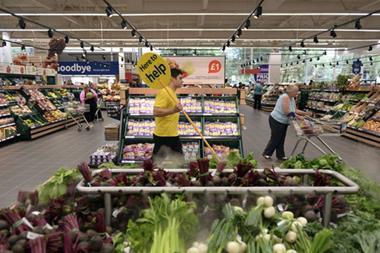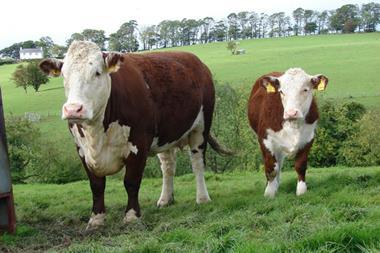
British consumers should be encouraged to curb food waste and cut back on meat consumption to ensure food security and avoid ‘shocks’ to global food prices, a new report by MPs has suggested.
The cross-party International Development Committee launched the report ‘Global Food Security’ today to coincide with an international summit on nutrition hosted by the UK government in London on 8 June.
The report cited figures that suggest as much as 30% of food produced globally is wasted: “We recommend that the government set targets for food waste reduction for producers and retailers and introduce sanctions for failure to meet the targets.”
“In the longer-term it may be appropriate to focus on sustainable systems such as pasture-fed cattle rather than on grain-fed livestock, with meat promoted as an occasional product rather than an everyday staple”
Global Food Security report
In a statement, committee chair Sir Malcolm Bruce warned: “There is no room for complacency about food security over the coming decades if UK consumers are to enjoy stable supplies and reasonable food prices.”
MPs singled out rising global demand for meat as a factor that will pile pressure on food prices, because more land is being used to grow crops to feed animals rather than humans: “This does not mean that the world should stop consuming meat: this would be disproportionate and unrealistic.
“However, in the longer-term it may be appropriate to focus on sustainable systems such as pasture-fed cattle rather than on grain-fed livestock, with meat promoted as an occasional product rather than an everyday staple.”
The committee’s report also looked at the effects of increasing demand for biofuels on food security and prices. “Biofuel crops not only displace food crops but are in some cases providing energy sources that are potentially more damaging to the environment than fossil fuels,” Sir Malcolm Bruce added.
The MPs said the European Union’s Renewable Transport Fuel Obligation (RTFO), which is due to take effect from 2020, should exclude agriculturally produced biofuels.
Mixed response
Responding to the report, meat industry body EBLEX said that lean red meat provides key nutrients and is recommended by the Department of Health as part of a balanced diet.
It added that it already championed the rearing of pasture-fed cattle: “Sixty-five percent of UK farmland is only suitable for growing grass and our rain-fed pasture system means we have one of the most efficient production systems in the world. EBLEX continues to work with ruminant producers, through our knowledge transfer programme, to ensure they make the most of this.”
Chief executive of the British Poultry Council Andrew Large described the committee’s recommendations on meat consumption as “disappointing”.
“Poultry meat is a wholesome and nutritious protein source and should be an important feature of a healthy diet.
“At a local level, it might be sensible for us to reduce meat consumption, and the reality is that price increases will probably lead us to do this voluntarily”
Prof Richard Tiffin
“Thanks to a short supply chain, the poultry industry contributes efficiently to feeding the world, in an environmentally responsible way.”
Professor Richard Tiffin, director of the Centre for Food Security at the University of Reading, warned the report was in danger of “oversimplifying” the issue of meat production.
“The report correctly states that we need to identify sustainable livestock systems, but it is not necessarily true that extensive pasture-based systems are more sustainable. For example, there is evidence to suggest that more intensive feeding reduces the considerable emissions of greenhouse gases caused by livestock.
“At a local level, it might be sensible for us to reduce meat consumption, and the reality is that price increases will probably lead us to do this voluntarily,” he added.

















No comments yet